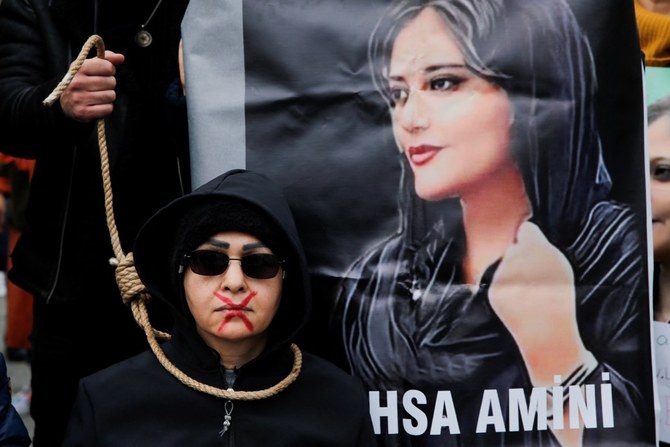JEDDAH: Courts in Tehran have sentenced 400 people to jail terms of up to 10 years over their involvement in protests sparked by Mahsa Amini’s death, Iran’s judiciary said on Tuesday.
Iran has been gripped by nearly three months of protests — which officials describe as “riots” — since the death of Amini after her arrest for an alleged breach of the country’s dress code for women.
“In hearings on cases of rioters in Tehran province, 160 people were sentenced to between five and 10 years in prison, 80 people to two to five years and 160 people of up to two years,” Tehran’s judiciary chief Ali Alghasi-Mehr said.
Opinion
This section contains relevant reference points, placed in (Opinion field)
The regime has drawn widespread international condemnation after executing two men in the past week in connection with the unrest.
Majidreza Rahnavard and Mohsen Shekari, both 23, were hanged on Monday and Thursday respectively on the charges of “moharebeh” — or “enmity against God” under Iran’s law.
Prior to the two executions, Iran’s judiciary said it had issued death sentences to 11 people over the protests, but campaigners say around a dozen others face charges that could see them also receive the death penalty.
The world union of professional footballers FIFPRO said it was “shocked and sickened” by the risk of Iranian footballer Amir Nasr-Azadani being sentenced to death in connection with protests.
BACKGROUND
The regime has drawn widespread condemnation after executing two men in the past week in connection with the unrest.
Nasr-Azadani was arrested in the city of Isfahan two days after allegedly taking part in an “armed riot” in which three security agents were killed on Sept. 16, Isfahan’s judiciary chief Abdullah Jafari said.
“FIFPRO is shocked and sickened by reports that professional footballer Amir Nasr-Azadani faces execution in Iran after campaigning for women’s rights and basic freedom in his country,” the union tweeted on its page.
“We stand in solidarity with Amir and call for the immediate removal of his punishment,” it added.
France’s foreign minister said she would summon Iran’s charge d’affaires over the country’s role in crackdowns on protesters at home and the treatment of seven French nationals, currently in custody.
The UK announced new sanctions against Iranians and senior Russian military commanders, involved in the producing and supplying drones to target Ukraine.
Iranian-manufactured drones supplied to Russia have played a “central role” in such attacks, the Foreign Commonwealth and Development Office said.
Foreign Secretary James Cleverly said the Tehran regime, which has been hit by a wave of civilian protests in recent months, was “striking sordid deals” with Moscow “in a desperate attempt to survive.”

















